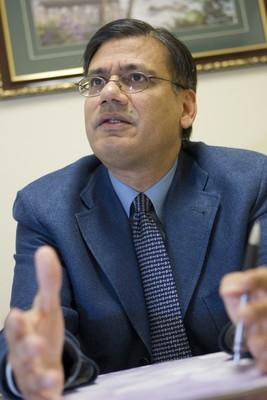UMC’s choices tough for all

University Medical Center’s financial woes have prompted heated discussion over cutting some specialty care services, such as the pediatric endocrinology clinic or the Lion’s Burn Care Center.
But medical officials are worried as well about another unintended consequence: Some medical graduate students might have to seek residency training in other states.
Should that happen, it could impact the state’s already shallow physician pool, said Dr. Farooq Abdulla, associate medical director of UMC’s neonatal intensive care unit.
“Our residents in plastic surgery get the best experience dealing with patients who have experienced some of the worst kind of burns. Without the Lion’s Burn Care Center, they’d probably have to go to another state for this kind of experience. There isn’t another burn center in Nevada,” Abdulla said.
“Thirty-six residents rotate through UMC and Sunrise Hospital’s neonatal intensive care units. Losing one of these units would require these medical students to fight over time at the other hospital or go somewhere else.”
The Lion’s Burn Care Center and UMC’s 36-bed neonatal intensive care unit are among 10 patient specialty care services tagged for possible closure.
The hospital’s administrators said those optional trims could reduce next year’s anticipated operating budget deficit of $53.7 million.
The hospital’s board, comprised of Clark County commissioners, is gathering feedback from the public, employees, community leaders and stakeholders regarding which services should stay.
The University of Nevada School of Medicine has residency programs in general surgery, internal medicine, family medicine, pediatrics, obstetrics and gynecology, plastic surgery, surgical trauma, psychiatry and emergency medicine.
All students graduating from medical schools must participate in advanced training to become practicing physicians in various specialty disciplines offered at accredited medical facilities.
Each program requires residents to get training in multiple areas of a hospital or medical facility. For instance, a resident in pediatrics would not only need to spend time in a neonatal intensive-care unit, they might also have to spend time in the pediatric endocrinology clinic or Family Wellness Center.
The School of Medicine also has residency rotations at Sunrise Hospital in pediatrics, Nellis Air Force Base and in some Reno hospitals, said Dr. John McDonald, dean of the University of Nevada School of Medicine.
There are 238 residents rotating through programs in Nevada, school officials said. Of those, 160 are being trained in Las Vegas. Each of the Las Vegas residents rotates through one or more areas at UMC, McDonald said.
“It would have a devastating impact on Clark County if UMC were to change its mission or to close any of its specialty care services,” McDonald said. “Our residents get major training at UMC in many of the specialty areas being proposed as cuts, so they are vital to the success of our education program. We are joined at the hip.”
Additionally, McDonald said residents tend to seek employment or start practices where they finish their residency training. Should medical students not receive their specialty training at a Nevada hospital, the state could lose them as future physicians.
“We are third highest in the country for retention in physicians,” McDonald said. “Seven in 10 who complete their residency training in Nevada stay in Nevada. That is why there is an emphasis on growing our residency programs and growing the school.”
Several UMC services, such as the pediatric endocrinology clinic and HIV Wellness Center, are unique to Southern Nevada, though patients could receive treatment from private physicians.
The Lion’s Burn Care Center is the only one of its kind in the state, providing inpatient and outpatient care to residents of Utah, Arizona and California as well as Nevada.
UMC interim CEO Kathy Silver acknowledges that cutting the Lion’s Burn Care Center would negatively impact the School of Medicine’s surgery residency training program.
Still, she said, if any of the other specialty areas are cut, the hospital’s residency program would continue because there are other areas of the hospital where residents can be trained.
“If the burn unit was closed and the plastic surgery residents weren’t able to rotate, they would have to rotate somewhere else,” she said. “Absolutely no decisions have been made as they relate to cutting these services. They will not be made until all options have been sufficiently explored.”
Silver said the hospital has made great strides in recent months in focusing on the next revenue cycle and on reducing expenses. However, she did not specify a timetable as to when any decisions will be made about the hospital’s future.
“I think our employee focus groups will be finished within the first two weeks of June. The next 30 to 60 days we will get additional feedback from stakeholders. Once those focus groups are complete, we will take back what we’ve learned to our board. Ultimately, it us up to the hospital’s board to make a decision.”